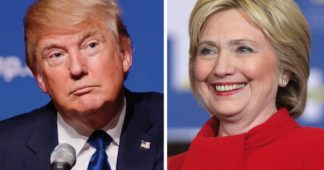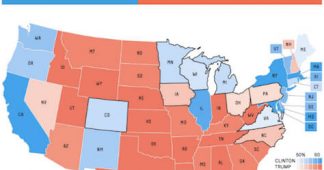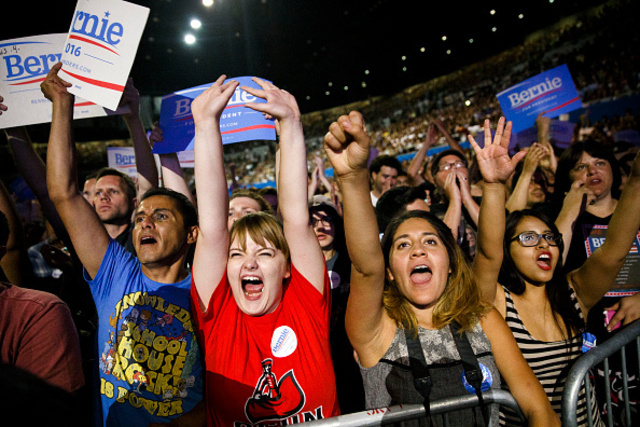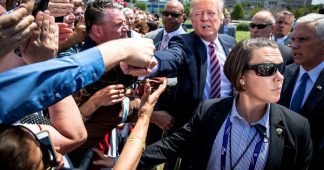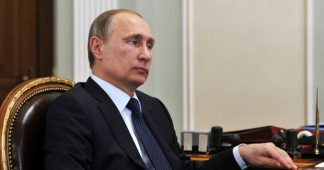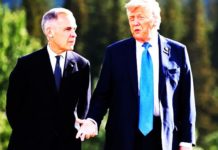German corporations donate to Trump
By Ulrich Rippert
(First published on 23 July 2016)
Reaction in the German media to the nomination of Donald Trump as the Republicans’ official presidential candidate swings between horrified incredulity and the hope that, in the end, Hillary Clinton will win the election and prevent the worst.
The Süddeutsche Zeitung published an editorial on Thursday titled, “It’s sad that Donald Trump has come so far.” The paper writes, “Trump is not a man who will become president as a result of his political convictions, but will become president because he is convinced about himself.” He is unpredictable and his political programme can be summed up in five letters, Trump.
It was true that Richard Nixon was an “authoritarian narcissist.” But Trump is much worse and has risen as an ego-star, “a celebrity, such as exists only in the United States.”
Under the headline, “Trump is a threat to the global economy,” the conservative Frankfurter Allgemeine Zeitung (FAZ) warns that with a President Trump the US would lose its “reliability factor in world politics.”
In a guest editorial reprinted from the Los Angeles Times, the FAZ writes of a possible military coup in the oldest democracy in the world. Under the headline, “If Trump wins, a coup isn’t impossible here in the US,” journalist James Kirchick develops a scenario in which President Trump gives the military an illegal command, which it refuses to carry out.
The article ends with the following: “Trump is not only patently unfit to be president, but a danger to America and the world. Voters must stop him before the military has to.”
German corporations with operations in the US reacted somewhat differently. As Die Welt reports, notable large concerns from Germany gave more than two-thirds of their election donations to the Republicans, and thus to Trump; above all BASF, Allianz, Siemens and Deutsche Bank.
Since US law prevents American or foreign companies from making direct donations to candidates, campaign funding takes place via so-called Political Action Committees (PACs). This is a legal construct allowing the circumvention of both the strict limit on donations as well as the ban on corporate donations. Via so-called super PACs, hundreds of millions of dollars flow into campaign advertising.
According to recent figures, the BASF PAC has distributed $399,000 in donations. The lion’s share of this money, a good 72 percent, flowed to the Republicans. This is not surprising, writes Die Welt. In previous election years, BASF, Allianz and Bayer had supported the Republicans.
According to Die Welt, in this election campaign the chemical and pharmaceutical group Bayer sent 80 percent of its donations to benefit the Republicans. At financial services company Allianz it was 72 percent.
Deutsche Bank, on the other hand, changed political camps. The paper writes: “While Deutsche Bank donated comparatively little, only $37,000, it is remarkable that 86 percent of this money was distributed to the Republican camp.” Such a clear tendency could not be seen in any other German company.
That Deutsche Bank sympathises with the Republicans is new. In 2006 and 2008, the bank had clearly tended toward the Democrats. The change of side was not surprising, “since Deutsche Bank is the largest lender to Donald Trump.” For the renovation of a hotel in Washington, Trump borrowed $170 million from Deutsche Bank.
The bank was not happy about the research carried out by Die Weltjournalists, and distanced itself from its own PAC. When questioned, it responded by saying, “employees decide for themselves concerning their donations and are not influenced by the company.”
Despite the election donations, German business associations have reacted critically to Trump’s economic plans. His announcement to close off the US economy for other countries, especially China, through protective tariffs, has triggered concern and warnings of a trade war.
“More protectionism and isolation would be bad for the German export industry, but also the American,” warned Oliver Zander, chief executive of Gesamtmetall (the Federation of German Employers’ Associations in the Metal and Electrical Engineering Industries). “The German economy depends on good transatlantic trade relations.”
“The machine and plant manufacturers see things similarly,” writes the online magazine finanz.net. It quotes the president of the industry association VDMA, Reinhold Festge, saying, “More protectionism in America is the last thing German-American economic relations need.”
According to finanz.net, the US election campaign is being followed meticulously in the boardrooms of German companies. This stems from the specific weight of the United States. “The country is the largest national economy and thus the most important impulse generator for the world economy: Nearly 16 percent of value creation is attributable to the United States.”
Since 2015, the United States was also the largest purchaser of goods “Made in Germany”: German exporters sell around €114 billion worth there, for the first time in six decades replacing France as the number one customer. Conversely, goods worth €60 billion were imported into Germany from the US.
